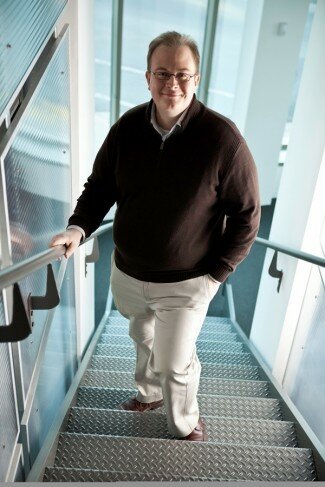Getting Results: Local CEO tosses the time clock
 Meddius and Intalgent CEO Jeff Gunther allows his employees to work when they want.
Meddius and Intalgent CEO Jeff Gunther allows his employees to work when they want.PHOTO COURTESY JEFF GUNTHER
Last year, local business owner Jeff Gunther allowed his 22 employees to do something that most employees can only dream about: set their own work schedules. The creator of OpenSpace, a 6,000 square-foot space in the Ix buildings that rents tech-friendly workspace by the hour, Gunther also runs two high-tech startups that were looking for a better way to deal with employees.
“Some people thought I was crazy,” Gunther told author Daniel H. Pink, whose new book Drive: The Surprising Truth About What Motivates Us features a section on Gunther’s experiment. “They wondered, ‘How can you know what your employees are doing if they’re not here?’”
But Gunther, founder of Charlottesville-based Meddius and Intalgent, portrays the experiment as a success. He says his employees have been more productive and less stressed, free to focus on work instead of office dynamics.
“Management isn’t about walking around and seeing if people are in their offices,” Instead, Gunther says, it’s about “creating conditions for people to do their best work.”
However, the experiment isn’t completely novel. Tech companies including IBM, Sun Microsystems, and Google have been experimenting with this for a while. In fact, certain Google employees are allowed to take a day off each week to pursue their own interests, and close to half of Sun Microsystems employees telecommute.
Gunther, however, has adopted what’s become known as a ROWE (Results-Only Work Environment), a concept founded by former human resources officials Cali Ressler, 33, and Jody Thompson, 53, who implemented the idea at Best Buy in 2005. Since then, the duo has become a mainstay on the corporate lecture circuit and have been featured in TIME Magazine , 60 Minutes, and on NPR.
In 2008, they penned Why Work Sucks And How To Fix It, a book that Gunther says inspired him to implement ROWE at his companies.
“Of course, people need enough money to take care of their families,” says Gunther in an interview with the Hook, “but the new currency is people being able to have autonomy and time for their families.”
In fact, Gunther says new hires have taken pay cuts to join his team, valuing the work environment over the paycheck, which has saved Gunther money and made the employees happier. It’s also allowed him to attract and hold on to valued employees.
“I can’t imagine working somewhere else because I couldn’t give this up,” says Lea Austin, Gunther’s chief of staff, who joined the company a year ago after working in a more regimented environment. “Here, I can workout whenever I want, visit my child at school, or run errands. I can really make my life work.”
Indeed, Gunther, who is in his early 30s, says that he and his wife left high-paying jobs in Northern Virginia when their daughter was born in 2003, hoping for a better quality of life in Charlottesville. Adopting a ROWE workplace is an extension of that.
“We joke about it being a workplace for adults,” says Gunther, pointing out that many traditional workplaces tend to treat employees like children, handing out punishments for being late, requiring a doctor’s note following a sick day, and making attendance at company meetings and events mandatory.
“All meetings here are optional,” says Gunther.
However, Gunther admits that allowing all this freedom has its challenges, such as making sure that people stay on task.
“You have to define really good goals,” he says. “We set them for each employee every three months, which can be hard to do.” To maintain a sense of connectedness in this unstructured environment, Gunther also gives every employee an iPhone.
“You have to be a good communicator,” says Austin, who admits that she probably works more actual hours than she would in a 9 to 5 job, and that the system isn’t for everyone, “so there’s an increased responsibility to maintain trust and accountability.”
For example, in addition to keeping focused on goals, Austin says it’s also important to let everyone know when you’re going to be ‘off-line’ and to respect when others are.
“It takes some getting used to,” she says, “but most of us enjoy this way of working so much that we don’t want to screw it up.”







Well we have that concept at my company with only one difference, management employees have generous time off, personal days, sick days, vacation, comp time etc. while production employees are held to an extremely rigid work and vacation schedule, with a “points” system.
Collect enough points and you are out.
So there is no incentive to change because management does not give a rats patoot if production employees are unhappy.
It often makes me wonder who the more valuable employees are.
Our production levels most often exceed goals which has more to do with engineering improvements, employees scared to loose their job, a solid midwest farmer work ethic bred into many of the employees, than anything that management has done.
Hawes, would you please make this part of the masthead? It would be an invaluable public service.
lose |loōz|
verb ( past and past part. lost |lôst; läst|) [ trans. ]
1 be deprived of or cease to have or retain (something)
2 become unable to find (something or someone)
3 fail to win (a game or contest)
loose |loōs|
adjective
1 not firmly or tightly fixed in place
2 (of a garment) not fitting tightly or closely
3 relaxed; physically slack
In theory this is great. I’ve heard Mr. Gunther speak and I like his enthusiasm and his business model. However it takes courage and a willingness to think outside the box that the majority of employers in Charlottesville lack. Ask any employer how hard their employees are working and they point to the person who is in early and leaves late. The fact that they may spend 1/2 their day surfing the internet is immaterial. It’s the PERCEPTION of hard work, not the end result and quality of that end result that seem to influence most employers. We need smarter employers who know where they want to take their companies, who can set clear goals and who can break their ties with past methods of measuring productivity. I dare you to find more than 3 employers in Charlottesville who can meet those criteria.